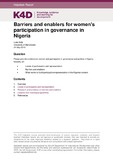| dc.contributor.author | Kelly, Luke | |
| dc.coverage.spatial | Nigeria | en |
| dc.date.accessioned | 2019-07-29T13:11:42Z | |
| dc.date.available | 2019-07-29T13:11:42Z | |
| dc.date.issued | 2019-05-24 | |
| dc.identifier.citation | Kelly, L. (2019). Barriers and enablers for women’s participation in governance in Nigeria. K4D Helpdesk Report. Brighton, UK: Institute of Development Studies | en |
| dc.identifier.uri | https://opendocs.ids.ac.uk/opendocs/handle/20.500.12413/14588 | |
| dc.description.abstract | Levels of female participation and representation in Nigerian politics are low. A sexist and patronage-based political culture, combined with gendered economic and household inequalities, are seen to be the main barriers to women’s participation in governance. The literature points to quotas, empowerment programmes and better electoral monitoring as possible solutions, but successive governments have been reluctant to implement binding measures. The Nigerian government has published statistics on women in elected positions and data is available for national positions for the period 1999-2019. The literature focuses on the mechanisms of Nigerian politics, namely the party system and the prominent role of patronage and corruption; conservative and sexist beliefs and practices across Nigerian society; the use of violence and hate speech against women candidates and voters; and the reluctance of the state to implement robust measures to improve women’s representation and engagement. However, there are relatively few rigorous and comprehensive studies explaining the relative importance of these causes for the small numbers of women in Nigerian politics, or ethnographic studies examining the effect of social practices and attitudes to women on a micro-level. Studies also exist of the role of women in comparable Sub-Saharan countries, using data on gross domestic product (GDP), political representation, and attitude surveys such as Afrobarometer, from which lessons relevant to Nigeria can be derived. Although numerous civil society organisations have programmes to increase women’s representation, many of their publications include evaluative statements rather than in-depth evaluations of the efficacy of different approaches. | en |
| dc.language.iso | en | en |
| dc.publisher | IDS | en |
| dc.relation.ispartofseries | K4D Helpdesk Report;596 | |
| dc.rights.uri | https://www.nationalarchives.gov.uk/doc/open-government-licence/version/3/ | en |
| dc.subject | Gender | en |
| dc.subject | Governance | en |
| dc.subject | Participation | en |
| dc.subject | Politics and Power | en |
| dc.title | Barriers and Enablers for Women’s Participation in Governance in Nigeria | en |
| dc.type | Helpdesk | en |
| dc.rights.holder | © DFID - Crown copyright 2019 | en |
| dcterms.dateAccepted | 2019-05-24 | |
| rioxxterms.funder | Department for International Development, UK Government | en |
| rioxxterms.identifier.project | K4D | en |
| rioxxterms.version | VoR | en |
| rioxxterms.funder.project | 238a9fa4-fe4a-4380-996b-995f33607ba0 | en |

